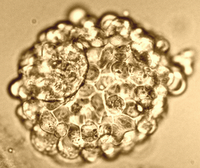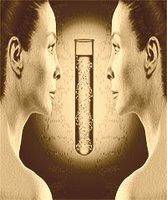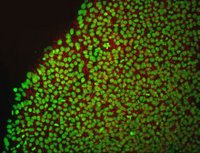Q: If Christians claim to be pro-life and if stem cells promise cures for disease, why do many Christians oppose the Missouri Stem Cell Initiative on this November’s ballot?
 A: Before responding, let’s quickly define “stem cells.” These are unspecialized “master cells” in the human body with the capability of growing into any of the body’s 200+ different specialized cells. This proposed amendment to the Missouri constitution focuses mainly on “embryonic” stem cells — that is, cells harvested in the first few days after conception (or of cloning). All people — including adults — have stem cells. So do placentas and so does umbilical cord blood.
A: Before responding, let’s quickly define “stem cells.” These are unspecialized “master cells” in the human body with the capability of growing into any of the body’s 200+ different specialized cells. This proposed amendment to the Missouri constitution focuses mainly on “embryonic” stem cells — that is, cells harvested in the first few days after conception (or of cloning). All people — including adults — have stem cells. So do placentas and so does umbilical cord blood.Regarding the opposition to Amendment 2 and related laws around the country, I can’t answer for all Christians, not even all Lutherans. Many who claim to be followers of Christ support this initiative; I certainly can’t speak for them. Among opponents, a variety of reasons exist; I’ll focus mainly upon my own, since I know them best.
The hymn “O God, Whose Will Is Life and Good” prays for those working in health care. The second stanza asks God to “Make strong their hands and hearts and wills to drive disease afar, to strive against the body’s ills and wage your healing war.” At first glance, the Missouri Stem Cell Initiative sounds like it will aid God in His “healing war.”
However, I believe that embryonic stem cell research (ESCR) stems from a poor understanding of the nature of God and of the human beings He created. Many Christians believe that life begins at conception. The initiative allows scientists to begin conceiving and growing new lives in the lab and then, after only a few days, to halt their growth (that is, kill them) by harvesting their cells in attempts to stave off disease or repair damage to fully grown human beings.
 Regarding procreation, Scripture calls children blessings and gifts from God. Solomon said, “Behold, children are a heritage from the Lord, the fruit of the womb a reward. (Psalm 127:3)” Throughout the Bible, the inability to have children was considered a problem — perhaps even a punishment from God. The accounts of Hannah, Sarah, Jacob’s wives, or Elizabeth can remind us just how far we’ve moved from desiring children accepting each and every child with joy.
Regarding procreation, Scripture calls children blessings and gifts from God. Solomon said, “Behold, children are a heritage from the Lord, the fruit of the womb a reward. (Psalm 127:3)” Throughout the Bible, the inability to have children was considered a problem — perhaps even a punishment from God. The accounts of Hannah, Sarah, Jacob’s wives, or Elizabeth can remind us just how far we’ve moved from desiring children accepting each and every child with joy.Instead, some people act almost like “baby factories.” They run cost analyses (“Can we afford a baby?”). They try to fit them in with other additions and changes (“Let’s wait until you finish your degree,” or, “Once this one is in preschool, we’ll have another.”). Children may be treated like commodities as prospective parents plan whether, when, and how many.
If people consider themselves as originators and “manufacturers” of the next generation of lives, they may forget that God begins and sustains the process: “I am fearfully and wonderfully made. Wonderful are your works; my soul knows it very well. (Psalm 139:14)” God notices each and every conception as He did that of the prophet Jeremiah, of whom the Lord said, “Before I formed you in the womb I knew you, and before you were born I consecrated you (1:5)” See how He claims full responsibility even for pre-born life.
If we treat our offspring like manufactured items, would it seem unusual to think of ourselves in the same manner? If we break down, we can look for “spare parts.” Unfortunately (?) no factory manufactures new brain cells for Alzheimer’s victims or Parkinson’s sufferers. No plant constructs new organs or limbs to replace those taken by accident or by cancer. Proponents of ESCR seem to promise, “Give us enough time and lots of money and we’ll give you the ability to grow new limbs, rebuild damaged or defective organs, and replace faulty brain cells.”
At what spiritual cost does this come? If all human life is divinely originated, then no human life is too small or insignificant to escape God’s concern. You can use the scientific terms, but whether you call it an embryo, a zygote, a blastocyst, or a fetus, how can you escape calling it a baby, a child, and a human being? Have we departed so far from God that we willingly would begin and then sacrifice new lives in the laboratory in order to manufacture spare parts for ourselves?
 As our Redeemer, God is also one of us. In His incarnation in the womb of the Virgin Mary, the eternal Son of God assumed human flesh, not by ordinary sexual relations but by a divine miracle. From the time the Son lived as a single cell in Mary’s womb, during those first few days when was “only” a mass of stem cells, and as He slowly took the form we recognize as a baby, He was also the Son of Man.
As our Redeemer, God is also one of us. In His incarnation in the womb of the Virgin Mary, the eternal Son of God assumed human flesh, not by ordinary sexual relations but by a divine miracle. From the time the Son lived as a single cell in Mary’s womb, during those first few days when was “only” a mass of stem cells, and as He slowly took the form we recognize as a baby, He was also the Son of Man.Before conception, the Son was fully, truly, one hundred percent God. After conception — indeed, at the very point of conception and onward forevermore — He also was, is, and will remain fully, truly, one hundred percent human. Scripture speaks of no “God-embryo” or “God-fetus”; God’s Word knows only God, man, and the God-man Jesus Christ. He was “pre-human” only while He was pre-conception. Why, then do so many try to divide mortal life into “pre-human” and “human” existence? Why classify an unborn life as “stem cells” or “embryo” or “fetus” or “spare parts” until late-term pregnancy or birth?
Space prevents detailing all my objections to Amendment 2 but I’d like to touch on a few more points. As noted above, all people have stem cells. More research has been done and more prospective cures have been discovered with adult than with embryonic cells. For instance, bone marrow transplants introduce new stem cells into recipients’ bodies, where they become various types of blood cells needed for survival. This initiative leads us away from existing science.
 The amendment only bans cloning by redefining the word. The American Heritage Dictionary says a clone is “A cell, group of cells, or organism that are descended from and genetically identical to a single common ancestor.” The genetic copies mentioned in Amendment 2 are clones. The initiative weasels out of this mess by saying that a clone isn’t really a clone until it’s implanted in a mother’s uterus.
The amendment only bans cloning by redefining the word. The American Heritage Dictionary says a clone is “A cell, group of cells, or organism that are descended from and genetically identical to a single common ancestor.” The genetic copies mentioned in Amendment 2 are clones. The initiative weasels out of this mess by saying that a clone isn’t really a clone until it’s implanted in a mother’s uterus.In my estimation, Amendment 2 promotes bad theology, shoddy science, questionable ethics, and poor law. Nothing convinces me that the citizens of our state will profit more than will the bio-research companies as they use embryonic tissue to manipulate adult hopes and fears in order to conduct experiments upon the earliest possessors of human life.
The Missouri Roundtable for Life provides A Word-By-Word Critique Of The So-Called “Missouri Stem Cell Research And Cures Initiative”. It notes that the amendment is badly written law. Roughly half the length of the entire U. S. Constitution, the amendment lists forty-five different sections of the Missouri Constitution it will change, replace, or delete. Shouldn’t Missouri citizens consider Amendment 2 an overly broad alteration of our state’s laws? This same analysis also points out the potential for exploiting women for the sake of their eggs and details other potential legal loopholes and possible consequences should this amendment become law.
 For additional information about and objections to Amendment 2, I suggest visiting Missourians Against Human Cloning. You may also follow related links from Lutherans for Life. LFL also has The “Deceitful Tongue” of the Missouri Stem Cells Research and Cures Initiative, a brief PDF file that can be printed as a bulletin insert or political handout. Concerned Women for America provides the article Missouri Stem-Cell Initiative Permits all Cloning, which also links to related topics. Additional commentary also appears regularly courtesy of the Pro-Life Blogs feed aggregator.
For additional information about and objections to Amendment 2, I suggest visiting Missourians Against Human Cloning. You may also follow related links from Lutherans for Life. LFL also has The “Deceitful Tongue” of the Missouri Stem Cells Research and Cures Initiative, a brief PDF file that can be printed as a bulletin insert or political handout. Concerned Women for America provides the article Missouri Stem-Cell Initiative Permits all Cloning, which also links to related topics. Additional commentary also appears regularly courtesy of the Pro-Life Blogs feed aggregator.Scripture quoted from The Holy Bible, English Standard Version™, © 2001 by Crossway Bibles.
Send email to Ask the Pastor.
Walter Snyder is the pastor of Holy Cross Lutheran Church, Emma, Missouri and coauthor of the book What Do Lutherans Believe.
Technorati Tags: embryonic stem cells | cloning | Missouri | Amendment 2 | Lutheran | Christian | pro-life | Missouri Coalition for Lifesaving Cures | fetus | foetus | zygote | blastocyst | embryo | government | church and state | conception | birth | Christ | Jesus | incarnation | Son of God | Son of Man
That's quite a collection of information!
ReplyDeleteI'm thankful that you included the Incarnational argument. That underscores the idea that our key argument isn't anti high tech, but pro sanctity of life, which has been sanctified by our Lord entering into it at its earliest stages.
"If all human life is divinely originated, then no human life is too small or insignificant to escape
ReplyDeleteGod’s concern."
IF.
You're willing to support a policy which could deny a great many actual living humans relief from real human suffering over an IF?
There is no evidence whatsoever that that all human life is divinely orginated. And if there were, maybe that divine creator would approve of stem cell research - life is abundant and ubiquitous on our planet after all.
The God of Islam, apparently, thinks life begins not at conception, but rather when the fertilized egg attaches itself to the wall of the uterus. This does not preclude research on stem cells.
Who are you to say you're right and Islam is wrong? Because Islam is *obviously* wrong? I agree, there is no evidence. But neither is there any evidence for Christianity.
Who says that life begins at conception? Maybe life begins before conception, with the attraction between a man and a woman.
Maybe rape should be legalized - isn't rape a lesser evil than preventing a potential life from being realized? Of course, that's insane, but so is the opposition to stem cell research.
That's the whole problem with "faith". An enterprise which regards the acceptence of "fact" without evidence as a virtue. It separates morality from real human suffering and causes suffering as a result. Every one can say they're right, just because. And then we get 9/11.